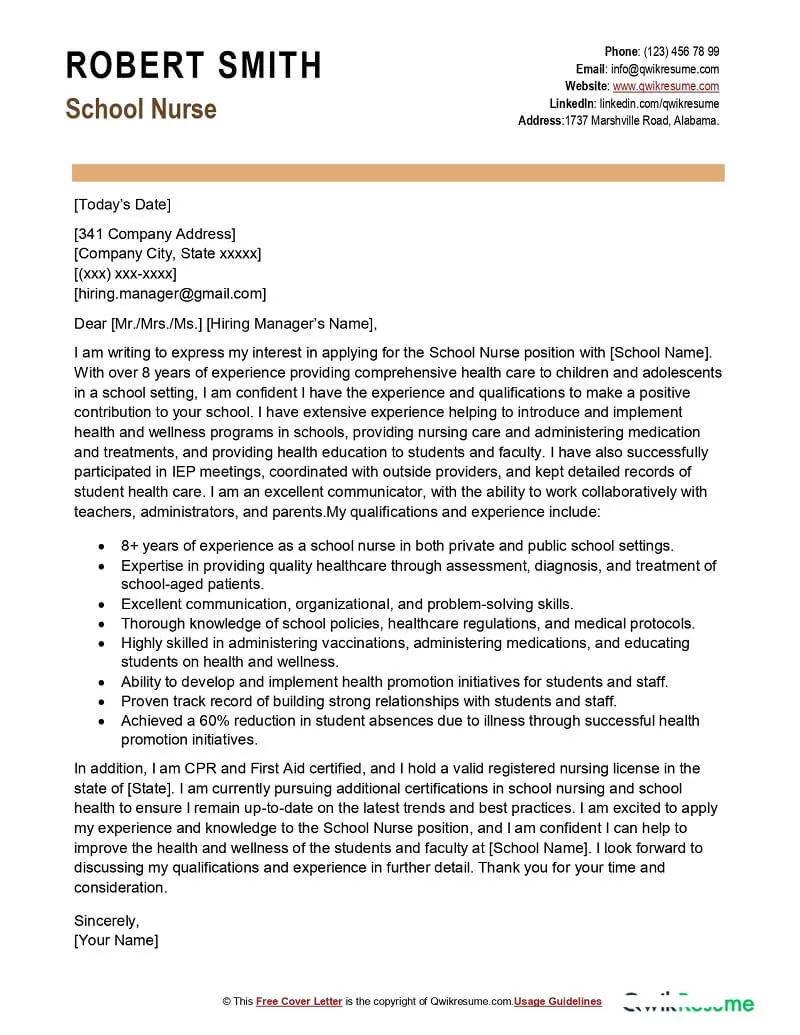Essential Cover Letter Components
A well-structured cover letter is your initial chance to create a positive impression on prospective employers. For a school nurse position, the cover letter serves as a critical introduction, showcasing your qualifications, experience, and genuine passion for student health. To distinguish yourself, it’s vital to include specific components that emphasize your suitability for the role. This guide will provide you with the top 5 tips to assist you in creating a cover letter that captures the hiring manager’s attention, improving your chances of securing an interview. By focusing on these key areas, you can build a compelling narrative that highlights your commitment to the health and well-being of students.
Highlight Your Skills and Experience
Your cover letter should begin by clearly stating the school nurse position you are applying for. Following this, succinctly highlight your relevant skills and experiences. Focus on the skills that align directly with the job description, such as experience in pediatric care, administering medications, providing first aid, and managing student health records. Briefly mention your previous nursing roles, emphasizing responsibilities that involved working with children and adolescents. For instance, if you have experience in a pediatric clinic or a summer camp, be sure to include that information. Tailor your content to match the job description, which will demonstrate your understanding of the school’s specific needs and requirements. Emphasizing your experience and skills ensures the hiring manager understands why you’re a great fit for the role.
Emphasize Relevant Certifications
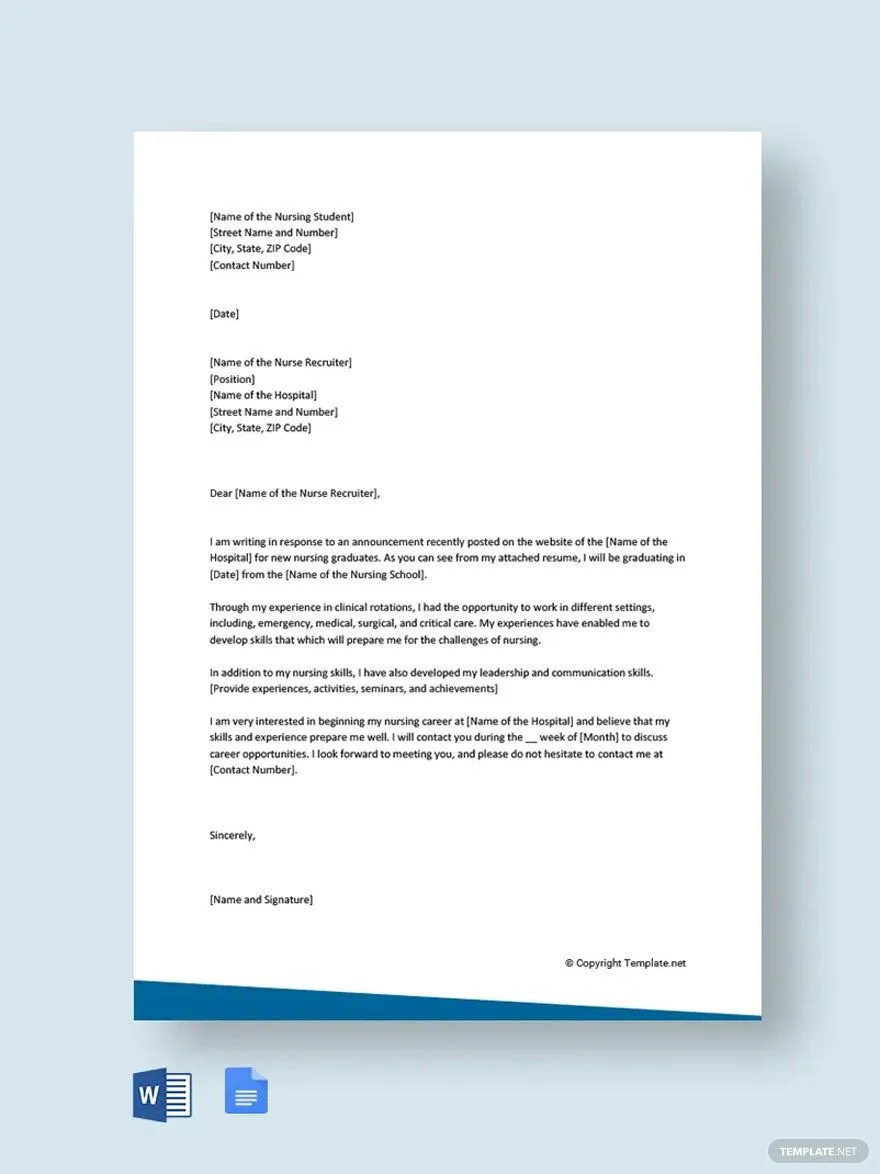
School nurse positions frequently require specific certifications and licenses. Ensure that these are prominently featured in your cover letter. Include your Registered Nurse (RN) license number, state of issue, and expiration date. Other certifications like CPR, First Aid, and Pediatric Advanced Life Support (PALS) are highly relevant. If the job description specifies particular certifications, such as a school nurse certification or a specific health-related certification, be certain to mention those explicitly. The inclusion of certifications demonstrates your commitment to professional development and your readiness to meet the health needs of students in a school setting. Consider placing a separate section in your letter dedicated to your certifications for easy reference, as it makes it simple for the hiring manager to verify your qualifications.
Showcase Your Passion for School Nursing
A successful school nurse is someone who is truly passionate about the health and well-being of children and adolescents. Use your cover letter to express this passion. Explain why you are drawn to school nursing and what motivates you to work with students. Share examples of how you’ve gone above and beyond in previous roles to support the health needs of children. Highlight your understanding of the unique challenges and rewards of school nursing, such as managing chronic conditions, providing health education, and collaborating with parents and teachers. Demonstrating your enthusiasm will significantly increase your appeal as a candidate, making the hiring manager more interested in your application. Consider including a brief personal anecdote related to your commitment to student health to create a more personal connection.
Focus on the Needs of the School
Before you begin writing your cover letter, research the school and understand its specific needs and priorities. Review the school’s website, mission statement, and any information available about its health services. Tailor your cover letter to demonstrate how your skills and experience align with the school’s requirements. For example, if the school serves a population with specific health challenges, mention your experience in managing similar conditions. If the school emphasizes health education, highlight your skills in developing and delivering health programs. By showing that you understand the school’s unique needs, you will prove your value to the hiring team and increase your chances of an interview. Customization shows that you’ve invested time and interest in the role and school, making you a more attractive candidate.
Proofread and Edit Meticulously
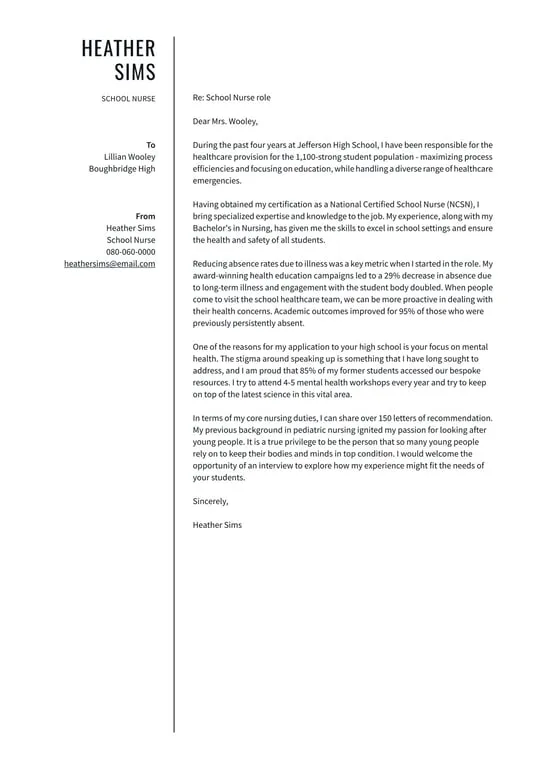
Before submitting your cover letter, it is imperative to proofread and edit it meticulously. Errors, typos, and grammatical mistakes can undermine your professionalism and make a negative impression. Read your letter several times, looking for any errors. Ask a friend or colleague to review your letter to catch any mistakes you may have missed. Ensure your formatting is consistent and visually appealing. The cover letter should be concise, well-organized, and easy to read. Pay attention to the tone, making sure it is professional and enthusiastic. A well-written, error-free cover letter shows that you pay attention to detail and are committed to excellence, making you a more desirable candidate, and it’s a small but essential step that significantly improves your chances.
Crafting a Compelling Opening
The opening of your cover letter is your first opportunity to capture the hiring manager’s attention. Begin with a strong opening that immediately states the position you are applying for and how you learned about it. Be specific about the job title and mention where you found the listing (e.g., school website, job board). The opening should be concise and direct, quickly establishing the purpose of your letter. This initial statement should convey your enthusiasm and interest in the role, which will set the tone for the rest of your cover letter. The goal is to create an immediate positive impression and encourage the reader to continue reading your letter, learning more about your qualifications and why you are the ideal candidate.
Address the Hiring Manager Directly
Whenever possible, address your cover letter to a specific person, such as the hiring manager or the principal of the school. Research the school’s website or use LinkedIn to find the name and title of the person responsible for hiring school nurses. Addressing the letter to a specific individual demonstrates your attention to detail and shows that you have taken the time to learn about the organization. If you are unable to find a name, use a professional salutation, such as “Dear Hiring Committee” or “Dear [School Name] Principal”. Avoid generic greetings such as “To Whom It May Concern”, as they can make your letter feel impersonal and less likely to be noticed. A personalized greeting sets a professional tone and shows initiative.
Express Enthusiasm for the Role
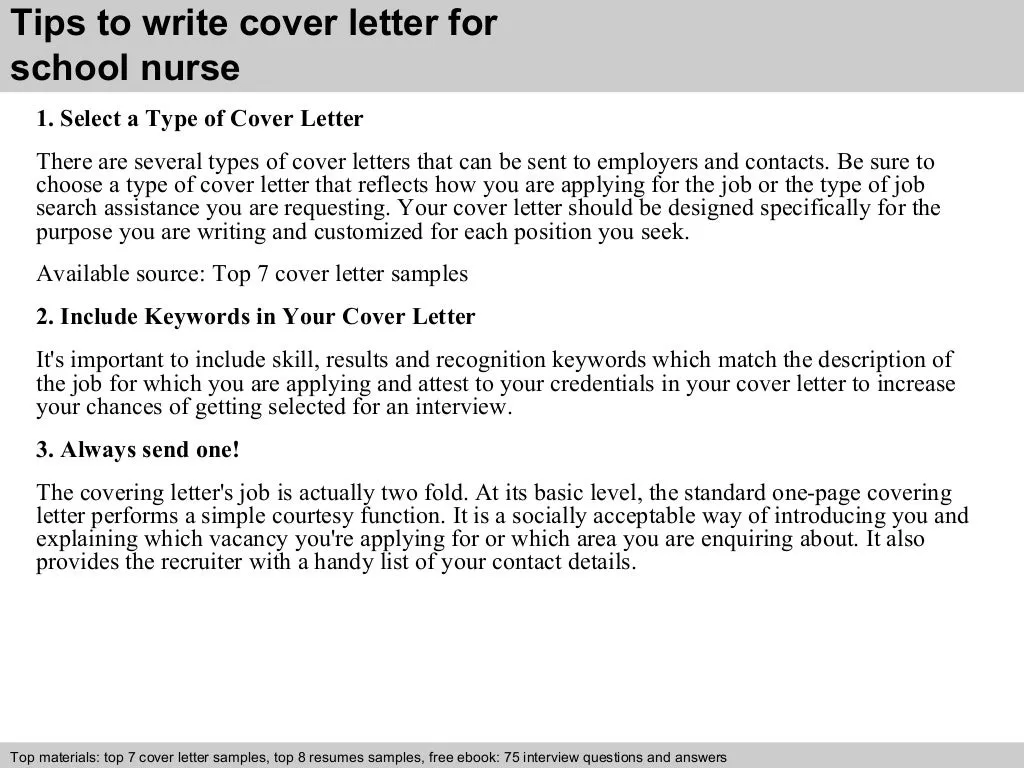
Show your enthusiasm for the school nurse position and the school itself. Express your excitement about the opportunity to contribute to student health and well-being. Briefly explain what interests you about the school and the specific role. This could include the school’s mission, its reputation, or its commitment to student health. Use phrases that convey your interest, such as, “I am excited about the opportunity to…”, “I am eager to contribute to…”, or “I am particularly drawn to…”. Let the hiring manager know why you are interested in working at their school. Your enthusiasm will make your application stand out and demonstrate your passion for school nursing. Expressing genuine excitement helps you connect with the hiring manager on a more personal level, enhancing your appeal.
Highlight Key Achievements
In the body of your cover letter, emphasize your key achievements relevant to the school nurse position. Focus on accomplishments that demonstrate your skills, experience, and ability to succeed in the role. Use specific examples to illustrate your abilities, rather than simply listing responsibilities. This is where you showcase what you’ve accomplished in previous roles and how your skills have led to positive outcomes. Provide quantifiable results whenever possible, such as the number of students you’ve helped or the percentage by which you improved health outcomes. Use action verbs to describe your achievements and highlight any awards or recognition you have received for your work. Highlighting your achievements is crucial, as it validates your capabilities and sets you apart from other applicants.
Quantify Your Accomplishments
Whenever possible, quantify your accomplishments to provide concrete evidence of your impact. Instead of saying, “Improved student health outcomes,” say, “Improved student health outcomes by 15% through implementing a new health education program.” Use numbers and data to illustrate your achievements. This could include the number of students you’ve cared for, the percentage reduction in absenteeism, or the number of health education sessions you’ve conducted. Quantifiable results provide objective evidence of your abilities and make your accomplishments more convincing. Hiring managers appreciate data-driven results that demonstrate your effectiveness and capabilities. Using numbers strengthens your claims and makes your letter more compelling, demonstrating a clear impact on previous roles.
Provide Concrete Examples
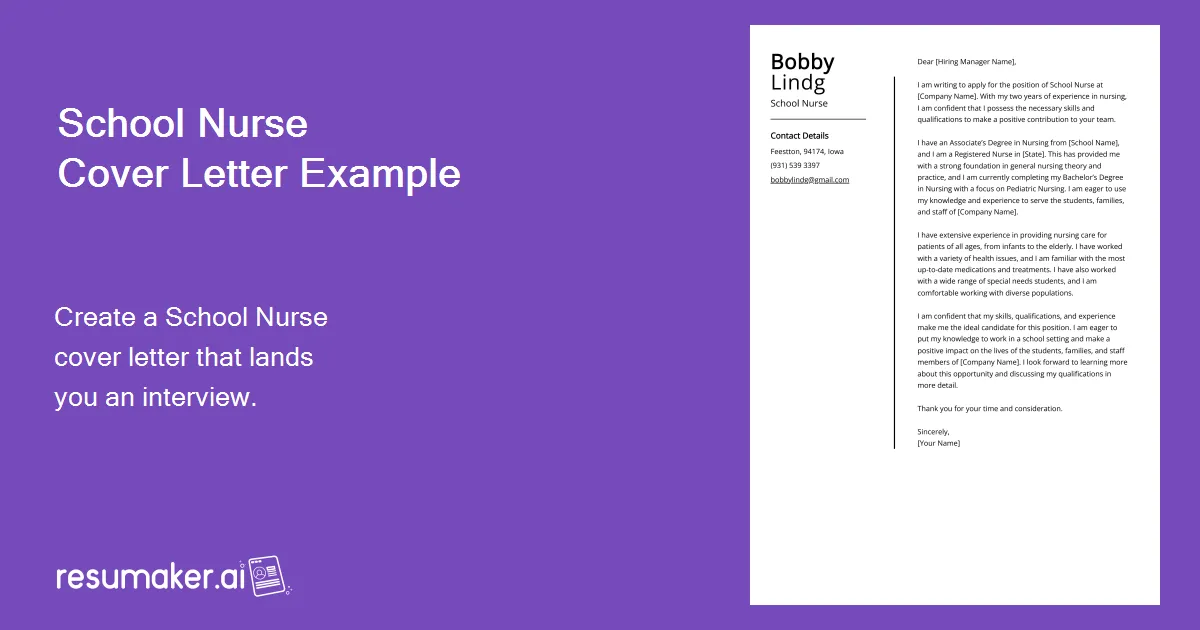
Support your claims with concrete examples from your past experiences. Describe specific situations where you demonstrated your skills and achieved positive results. For instance, if you are highlighting your experience in managing chronic conditions, provide an example of how you effectively managed a student’s diabetes. If you want to highlight your communication skills, share an example of how you successfully communicated with parents and teachers about a student’s health needs. These examples bring your skills to life and show the hiring manager how you have applied your skills in real-world scenarios. They add credibility to your claims and illustrate your abilities in a practical way. Providing specific instances enables the hiring manager to fully understand your capabilities.
Writing a Strong Closing
The closing of your cover letter should be as impactful as your opening. The closing should reiterate your interest in the position and express your eagerness to learn more about the opportunity. It should also include a call to action, encouraging the hiring manager to contact you. A strong closing leaves a lasting impression and encourages the reader to take the next step in the hiring process. This final part gives you a chance to re-emphasize why you’re a good fit for the role and why they should choose you. Make your closing professional and memorable, leaving the hiring manager with a positive impression of your enthusiasm and professionalism.
Reiterate Your Interest
Restate your enthusiasm for the school nurse position and reiterate your interest in the school. Thank the hiring manager for considering your application and express your appreciation for their time. Briefly mention why you are interested in working at the school, referencing specific aspects of the role or the school’s mission that appeal to you. This final expression of interest reinforces your passion and commitment to the role. Remind the hiring manager of what makes you a good fit and ensure they remember your qualifications and enthusiasm for the position, increasing the likelihood of an interview. Your aim is to leave the reader with a positive impression of your eagerness and suitability, which reinforces your commitment.
Include a Call to Action
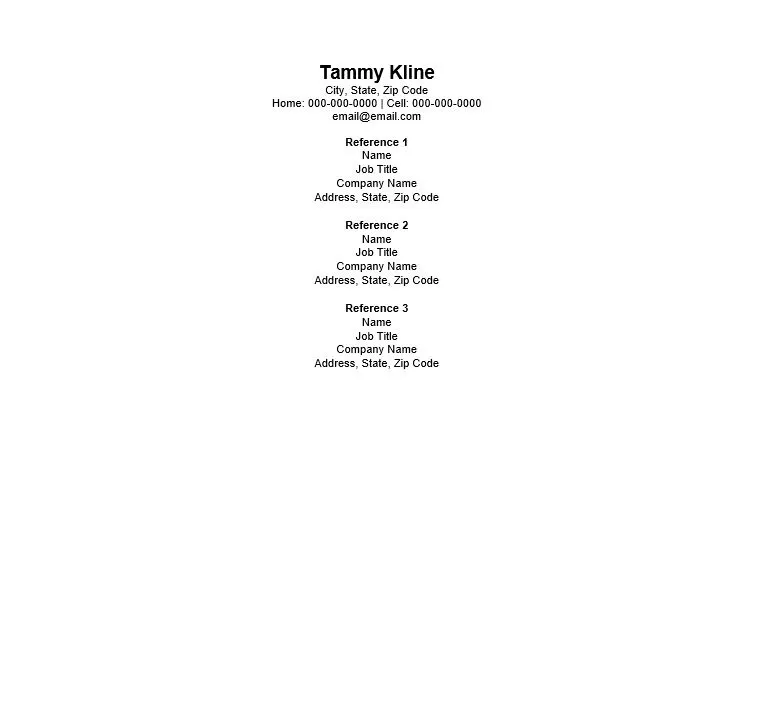
End your cover letter with a clear call to action. Express your willingness to discuss your qualifications further and invite the hiring manager to contact you for an interview. Provide your contact information, including your phone number and email address, making it easy for the hiring manager to reach you. You can also mention your availability for an interview. This direct approach demonstrates your interest in the position and makes it easy for the hiring manager to move forward with the application process. Be sure to include a professional closing, such as “Sincerely” or “Best regards,” followed by your name. A strong call to action increases the likelihood of getting an interview, which brings you one step closer to securing the job. Ensuring a clear call to action is essential.
